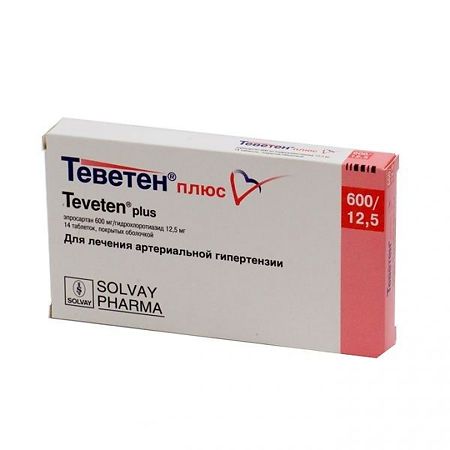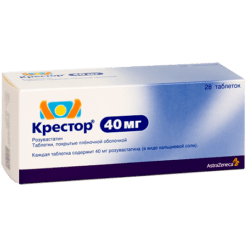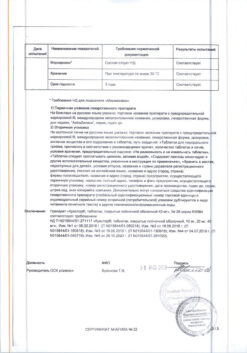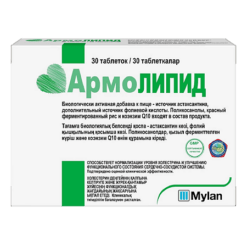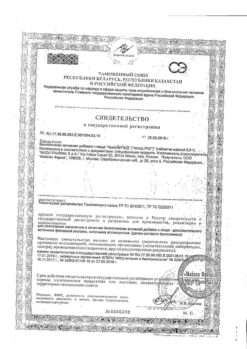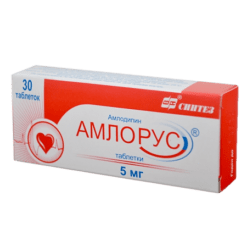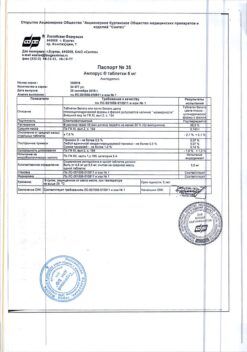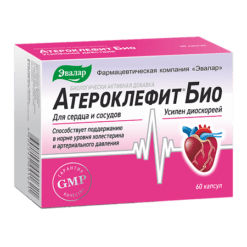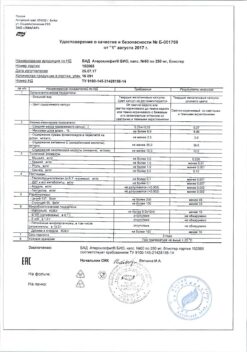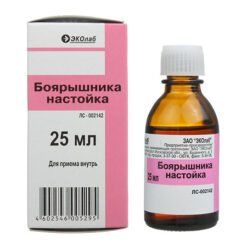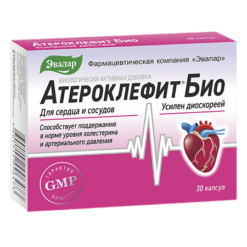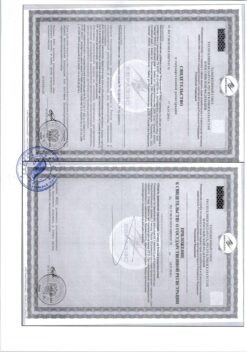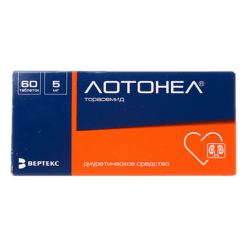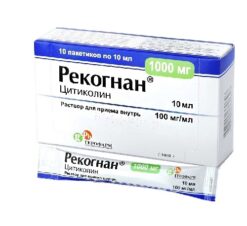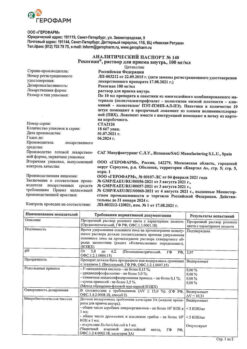No products in the cart.
Teveten Plus, 12.5mg+600mg 14 pcs.
€1.00
Out of stock
(E-mail when Stock is available)
Description
Teveten Plus has hypotensive, vasodilatory, diuretic effects.
Pharmacodynamics
Eprosartan
It acts selectively on AT1-receptors located in the vessels, heart, kidneys, and adrenal cortex, forming a strong bond with them followed by slow dissociation. Prevents or attenuates the effects of angiotensin II, inhibits the activity of the renin-angiotensin system. It reduces arterial vasoconstriction, OPPS, small circulatory pressure, water and sodium reabsorption in the proximal segment of the renal tubules, and aldosterone secretion. It has vasodilatory, hypotensive and mediated diuretic effect. With prolonged use it suppresses the proliferative effect of angiotensin II on vascular smooth muscle cells and myocardium.
The persistent antihypertensive effect persists for 24 hours without the development of orthostatic arterial hypotension and reflex tachycardia in response to the first dose. It has nephroprotective effect by reducing albumin excretion, while preserving renal autoregulation, regardless of the degree of renal failure. It has no effect on lipid, carbohydrate and purine metabolism. It does not cause “withdrawal” syndrome when discontinuing treatment. Eprosartan does not increase bradykinin-related effects mediated by ACE, such as coughing.
Hydrochlorothiazide
Hydrochlorothiazide is a thiazide diuretic. Thiazides affect electrolyte reabsorption mechanisms in the renal tubules, increasing the excretion of fluid, sodium ions and chlorine. Due to the diuretic effect of hydrochlorothiazide, plasma volume decreases, plasma renin activity increases, and aldosterone secretion increases, resulting in increased urinary losses of potassium and bicarbonates and decreased serum potassium concentration. The mechanism of hypotensive action of hydrochlorothiazide is a combined diuretic and vascular effects.
Teveten Plus
In patients with elevated BP, eprosartan provides a statistically significant reduction. Adding 12.5 mg of hydrochlorothiazide to a single daily dose (600 mg) of eprosartan provided an additional statistically significant decrease in BP compared to daily administration of eprosartan alone. Combined administration of eprosartan with hydrochlorothiazide reduces potassium loss associated with diuretic effect. The onset of diuresis occurs within the first 2 hours and the peak effect occurs after 4 hours. Maximum hypotensive effect usually develops after 2-3 weeks of treatment.
Pharmacokinetics
Eprosartan
The bioavailability after oral administration is approximately 13%. Plasma protein binding is high (98%) and remains constant over the entire therapeutic concentration range. The degree of binding to plasma proteins does not depend on sex, age, liver function and does not change in mild or moderate renal failure, but decreases in severe renal failure. Cmax of the drug is determined 1-2 h after oral administration.
When eprosartan is taken concomitantly with food, there is a clinically insignificant decrease in absorption (less than 25%), Cmax and AUC. The volume of distribution is 13 L, the total Cl is 130 ml/min. When administered orally it is eliminated mainly unchanged: in the feces – 90%, in the urine – 7%. A small part (less than 2%) is excreted by the kidneys as glucuronides. Acylglucuronide of eprosartan makes 20% of urinary concentration, 80% is unchanged drug.
It practically does not cumulate. Body weight and gender and race differences have no effect on the pharmacokinetics of eprosartan. Pharmacokinetics have not been studied in persons younger than 18 years of age. When treated with eprosartan, patients with moderate degree of chronic renal insufficiency – Cl creatinine from 30 to 59 ml/min, AUC and Cmax by 30%, and with severe degree (Cl creatinine from 5 to 29 ml/min) by 50% higher compared to healthy subjects. In liver failure, the AUC value (but not Cmax) increases, on average, by almost 40%. There is no need to adjust the dosing regimen in hepatic impairment, as well as in the elderly.
Hydrochlorothiazide
Hydrochlorothiazide is rapidly eliminated by the kidneys. At least 61% of the oral dose is eliminated unchanged within 24 hours. Hydrochlorothiazide passes through the placental barrier and is excreted with the breast milk.
Teveten Plus
The simultaneous administration of hydrochlorothiazide and eprosartan clinically does not have any significant effect on the pharmacokinetics of both components. Food intake has no effect on the bioavailability of eprosartan and hydrochlorothiazide, but delays their absorption. Tmax of eprosartan in plasma is 4 hours after intake, Tmax of hydrochlorothiazide is 3 hours.
Indications
Indications
Arterial hypertension.
Active ingredient
Active ingredient
Composition
Composition
1 film-coated tablet contains:
acting substances:
eprosartan mesylate 735.8 mg (corresponding to 600 mg of eprosartan), hydrochlorothiazide 12.5 mg;
auxiliary substances:
MCC – 43.3 mg;
Lactose monohydrate – 43.3 mg;
Corn starch gelatinized – 43.3 mg;
crospovidone – 38.5 mg;
magnesium stearate – 7.2 mg;
purified water – 50.9 mg;
coating:
Popadry (OY3736) – 31 mg (hypromellose, macrogol 400, colorants: titanium dioxide E171, iron oxide black E172, iron oxide yellow E172).
How to take, the dosage
How to take, the dosage
Overly, 1 tablet daily, in the morning, regardless of meals.
Teuven Plus does not require dosage adjustment in elderly patients, patients with mild to moderate hepatic impairment, and patients with impaired renal function (creatinine Cl over 30 ml/min).
Interaction
Interaction
Hypotensive effect may increase with concomitant use with other hypotensive agents. When using together with oral hypoglycemic agents, their doses should be corrected, because hydrochlorothiazide may decrease glucose tolerance. A reversible increase in the plasma concentration of lithium and an increase in the risk of its toxic effects is possible (close monitoring of lithium concentrations in patients simultaneously taking Teveten Plus and lithium is necessary). NSAIDs may decrease the diuretic and hypotensive effect of TevetenPlus.
While reducing potassium levels, hydrochlorothiazide may increase the effect of cardiac glycosides and some antiarrhythmic drugs. Hydrochlorothiazide increases the risk of hypokalemia when prescribed together with drugs that cause potassium loss, such as diuretics that have a potassium-reducing effect, laxatives, glucocorticoids, and adrenocorticotropic hormone (ACTH). Hydrochlorothiazide may increase the effect of nondepolarizing myorelaxants (e.g., tubocurarine). Absorption of hydrochlorothiazide is reduced by co-administration of anion-exchange resins such as colestyramine or colestipol.
Special Instructions
Special Instructions
Patients with impaired renal function. When treating patients whose vascular tone and renal function mainly depend on the activity of renin-angiotensin-aldosterone system, such as patients with severe heart failure III-IV according to NYHA, with bilateral renal artery stenosis or artery stenosis of the single kidney, close monitoring of renal function should be provided. If renal function deteriorates during treatment, treatment should be reconsidered. In patients with impaired renal function there may be azotemia associated with the use of hydrochlorothiazide.
Patients with impaired liver function. Hydrochlorothiazide should be used with caution in patients with moderate to severe hepatic impairment. There is no clinical experience with Teveten Plus in patients with severe hepatic impairment.
Metabolic and endocrine effects. Hydrochlorothiazide may decrease glucose tolerance, which may require dose adjustment of hypoglycemic agents in diabetic patients. During the course of treatment with Teveten Plus, latent diabetes mellitus may manifest. At the 12.5 mg dose of hydrochlorothiazide available in Teveten Plus, only minor metabolic or endocrine effects have been observed to date.
Electrolyte imbalance. Hydrochlorothiazide may lead to hypokalemia, hyponatremia, hypercalcemia, hypomagnesemia and hypochloremic alkalosis. Periodic determination of serum electrolytes should be provided for all patients treated with diuretics. Potassium-saving diuretics, potassium preparations should be administered together with Teveten Plus with caution.
Symptomatic hypotension. In decrease of the blood circulation, dehydration or decrease in electrolyte content (e.g., during treatment with high doses of diuretics, repeated vomiting, prolonged diarrhea, salt-free and hyposaline diet), taking the drug may cause a sharp decrease in BP (symptomatic hypotension). Before prescription of Teveten Plus such disorders should be eliminated by correction of sodium concentration in blood and BCC deficit. Transient BP decrease is not a reason for discontinuation of the drug, since in this case BP will stabilize with further administration.
Contraindications
Contraindications
With caution:
Side effects
Side effects
The overall incidence of adverse events reported in patients taking eprosartan is comparable to that reported with placebo. These effects were generally mild and of short duration, so that discontinuation was required in only 4.1% of patients treated with eprosartan in placebo-controlled clinical trials (6.5% in the placebo group).
CNS disorders: rarely – headache, dizziness, weakness.
Skin disorders: rare – transient rash, skin itching, urticaria.
Cardiovascular system disorders: very rarely – decreased BP, angioedema.
Hydrochlorothiazide did not increase the incidence of adverse events. Over many years of experience of using hydrochlorothiazide in clinical practice, the following side effects have been recorded:
Gastrointestinal side effects: anorexia, nausea, vomiting, diarrhea, constipation, jaundice, pancreatitis;
Nervous system side effects: dizziness, weakness, paresthesia, asthenia, headache, anxiety;
Cardiovascular side effects: hypotension, orthostatic hypotension;
Hematopoietic and lymphatic system disorders: leukopenia, agranulocytosis, thrombocytopenia, aplastic and hemolytic anemia;
Kidney disorders: interstitial nephritis, renal failure;
lung side: pneumonitis, pulmonary edema;
skin side: transient rash, vasculitis, toxic and epidermal necrolysis, systemic lupus erythematosus;
metabolism: hyperglycemia, hyperuricemia, gout, hyponatremia, hypokalemia, hypochloremia, hypercalcemia, hypomagnesemia, hypercholesterolemia, hypertriglyceridemia;
other: seizures, impaired sexual function, fever, anaphylactic reactions.
Overdose
Overdose
There are currently no data on overdose.
Symptoms: possible – excessive BP decrease, dehydration and electrolyte imbalance (hypokalemia, hypochloremia, hyponatremia) manifested by nausea and somnolence.
Treatment: depending on the time elapsed after the meal, the measures taken should include stimulation of vomiting, gastric lavage and/or taking activated charcoal. If BP is rapidly decreasing, the patient should be placed on his back with his legs elevated, and plasma exchange fluids given if necessary. In dehydration and water-salt balance disorders, symptomatic and supportive therapy is recommended. Hemodialysis is ineffective.
Pregnancy use
Pregnancy use
It is contraindicated in pregnancy. Breastfeeding should be stopped during treatment.
Additional information
| Shelf life | 3 years |
|---|---|
| Conditions of storage | In a dry place, at a temperature not exceeding 25 °C |
| Manufacturer | Mylan Laboratories SAS, France |
| Medication form | pills |
| Brand | Mylan Laboratories SAS |
Related products
Buy Teveten Plus, 12.5mg+600mg 14 pcs. with delivery to USA, UK, Europe and over 120 other countries.

